Dragon Age: Origins – hands-on
Regret, anger, injustice. Revenge
Brotrayal
Dragon Age might be dungeons and dwarves on the surface, but the commonplace fantasy archetypes belie the massive scale of the story. BioWare aims to offer a highly personal experience, allowing you to approach the game from six different perspectives, all of which vary even more depending on your decisions. “We want to ease the player into it and give them a bit of perspective according to whether you’re a dwarf or an elf or what your circumstances are - learn about the world through that character’s eyes before you actually enter the plot,” adds David Gaider, lead writer. The result? The most dialogue BioWare has ever put in a game, along with a replayable entry point for the vastest narrative the studio has ever produced.
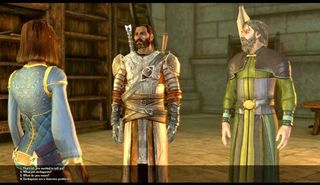
Returning to the noble halls of the dwarf kingdom, I learn that the feast celebrating my appointment as a commander also falls on the eve of a great battle against the darkspawn, the evil army that plagues the land of Ferelden. It’s been 400 years since the last Blight, a period when the darkspawn awakens an ancient dragon and makes a big mess of things for mankind. Much of the lore surrounding the darkspawn is a secret, but BioWare revealed to us that the dark coalition can corrupt mortals, converting their forms into evil equivalents. Corrupted dwarves become genlocks, the greenskinned foot soldiers of the darkspawn; tainted humans transform into hurlocks - zombielike marauders. “There’s not a whole lot of redeeming qualities about the darkspawn,” lead designer Mike Laidlaw points out. “They’re largely out to eat your liver, preferably while it’s still inside you.”
With this lump in my throat, dear old kingly dad sends me on a special mission: retrieve the shield of the legendary paragon Aeducan from a forgotten tomb far inside the Deep Roads, the networked tunnels that linked the dwarven kingdoms long ago before many were destroyed. I navigate the long caves, swapping between the members of my modestly armed party to clear out the gemlocks and giant spiders that clog the tunnels. I keep the raids I ran in WoW and Warhammer Online fresh in my mind - ability cooldowns, critical hits, and spell combos give combat a pace that feels balanced between being turn-based and active. You’re able to use an over-the-shoulder view to maneuver characters into precise position with WASD, and pause at any time to assign commands. I found at least one benefit to the real-time controls when I moved behind the last genlock, executing a backstab automatically to deal bonus damage.
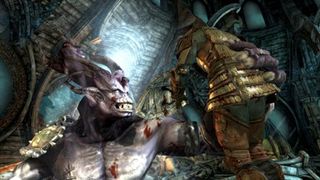
Further down the Deep Roads, a band of mercenaries has already reached Aeducan’s tomb. They only could have entered the shrine by using my brother Trian’s signet ring. The plot suddenly seems all too clear: Trian sent these goons to eliminate me and recover the shield so he could claim glory and clear his path to kingship in one fell swoop. I make quick work of the mercs, locate the shield, and stomp back to our rendezvous, ready to confront Trian, who seems convinced that I have a plot to murder him to take his heir. I chalk it up to jealousy and paranoia, and tell him I won’t surrender and stand trial - I’ve done nothing wrong. Trian echoes my defiance: “Nothing, not even my treacherous kin, will stop me from claiming my right!”
The camera peels back over my shoulder into combat. There’s no avoiding it now - either Trian dies, or I do. I jab the spacebar to pause and scan the scene: three archers, two armed dwarves, and Trian himself, waving a heavy war hammer. I opt for the tactical view, flicking the mouse wheel to zoom out for an isometric eye of the situation. From up high, I can plot attacks, abilities, and movement at my own pace. I’m ruining enemies with my brain power, and BioWare says that’s the plan. “There’s a very strong element of kicking ass, like: Hey, there are things over there with red circles - they will die,” says Laidlaw, playfully. “That’s the balance - having this neat story but also keeping it accessible so you don’t get overwhelmed by it, because there are times when you just wanna slaughter.”
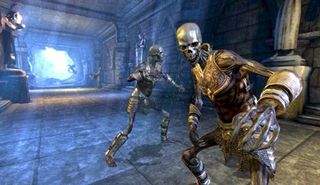
Pulling the camera back to click out orders, it’s easy to send an archer to a hilltop or a soldier to square off against a single irksome foe. Laidlaw wants players to feel like they’re orchestrating the combat, not just one sword and shield among a fray of foes. “That certainly goes back to the Baldur’s Gate experience,” Laidlaw says.
I swap two of my characters’ swords for bows, and point their pinning shot abilities at separate targets - disabling two enemies should give me enough time to focus some strikes on one of the guards. After four failed attempts, I manage to group fire on the archers early in the battle, dodging enough of Trian’s attacks to deal a finishing blow that decapitates my brother. Dwarftality!
Sign up to the 12DOVE Newsletter
Weekly digests, tales from the communities you love, and more
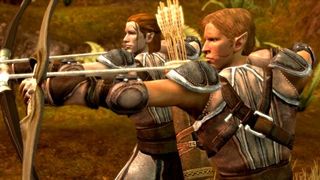
My father arrives on the scene too late. “My son, tell me this isn’t what it looks like, before my heart tears itself apart,” he pleads. He thinks that I’ve killed Trian to assure my spot as heir, but I argue my innocence. I fought in self-defense - Trian was the one who wanted me dead. He questions my partymates - they saw me take Trian’s signet ring from the mercenaries, they’d be my alibi. Instead, my archer lies: “Lord Aeducan came up to them all friendly-like, then when we were close he wanted us to attack.” The other soldier echoes his slander. I’ve been tricked! My party members were Bhelen’s cronies, meant to assure that I killed Trian, eliminating any witnesses while assuring my guilt. Bhelen set Trian and I against one another, relying on our distrust to clear his path to power. As judgment, I’m stripped of my nobility, and cast into the Dark Roads with only a sword and shield, exiled to fight darkspawn until my doom...
Dalishious
Elves have a fragile relationship with humanity in the world of Dragon Age. Long ago, pointy-eared people were enslaved by mankind, and today are still treated as second-class citizens. The Dalish elves, one of two origin stories we played, are nomads seeking to recover their race’s forgotten history by scouring Ferelden for relics and remnants of their people’s past. The origin’s opening scene frames the larger story of the Dalish. While hunting in the woods with a companion named Tamlen, you stumble upon three human travelers who claim to have found ruins and artifacts that bear elvish writing. Tamlen doesn’t buy the story, and prompts you to make a decision.
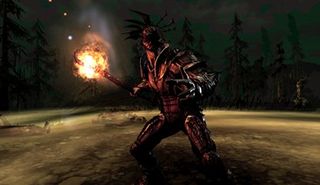
It’s here, four minutes into the origin story, that you’re given your first important dialog choice. One option tells Tamlen to kill one of the humans, but let the other two run to remind others to keep away from our camp. It seemed impossibly harsh to be serious, so I pick it just for kicks, thinking Tamlen will simply fire a warning shot and we’d have a good laugh about it. (Had I forgotten the dwarven noble I’d killed in my other origin story?) The human pleads for mercy, but Tamlen doesn’t pause before planting an arrow in his guts, dropping him into the grass. Oops.
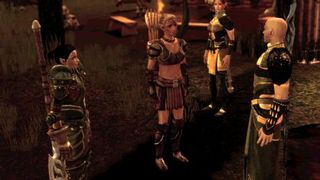
Combat-wise, playing as an elf rogue didn’t feel too different than my dwarven warrior, though I only leveled once, so I couldn’t unlock many abilities, talents, or specializations to flesh out my character. I still shot a bow and fought in close-quarters, but I did encounter poison traps, skeletons, and other natural enemies of HP within the elf ruins that I didn’t see elsewhere. I won’t spoil the rest of the Dalish origin, other than to say that I made friends with a grumpy spiked bear called a Bereskarn and may have stumbled on a magic mirror or two.
Wheel of morality
BioWare is bringing six total origin stories to Dragon Age: dwarf commoner, dwarven noble, city elf, Dalish elf, magi, and human noble. The pair we played showed promise - neither wasted time dropping big decisions in my lap, nor did they bog me down with petty errands simply to fill my EXP bar. Whether I was confronting family politics or recovering the forgotten history of my race as a Dalish elf, minutes into each, I was facing problems with true consequences.
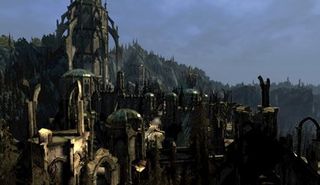
And that’s really the idea. The origins are designed to evoke the feel of your race and social status, and naturally establish your character’s perspective. You’re not going to be dealing with caste politics as an elf of the woods. You won’t be worried by racial tension or the trials of becoming a magic user when you’re a dwarven noble.
You can think of them as separate starting points - six threads that run parallel and intersect as you continue on a shared, but different, main quest path: becoming a Grey Warden, one of the legendary guardians against the darkspawn. You emerge from your origin having made hard, formative decisions that plant seeds for the rest of the plot. In turn, this means more complexity for player choice and party dynamics down the road. Party members will weigh in on your choices, and even make the decision to leave your group if you offend them enough. But maybe best of all, you’re not some run-of-the-mill knight that see-saws between good and evil based on which peasants you decide to lend a hand to. “We wanted to make a story that had some moral complexity to it. Rather than saying ‘here’s your Good and Evil bar,’ we can provide the player with options that will require him to think about what consequences they’re willing to live with,” says Gaider.
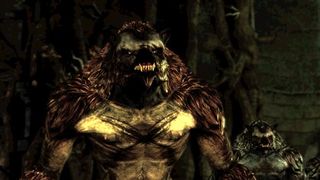
Along with the PC-friendly tactical combat, it’s this promise of complexity that excites us about Dragon Age - it’s the first time I’ve seen a single-player RPG that lets me enter the world in a way that’s tailored to my decisions from the start. Think of it this way: If Bethesda let players begin Fallout 3 not as six different vault dwellers, but as a raider, Brotherhood of Steel soldier, Enclave stooge, mercenary, or stay-at-home post-apocalypse homemaker, you might have a rough analog for what BioWare has in mind. Of course, the question remains: Can the rest of the game build upon the world-shaping decisions you make in your origin story? If it can, Dragon Age: Origins is on track to be a one of the most personal role-playing stories you’ll ever experience.
Feb 24, 2009
Most Popular



